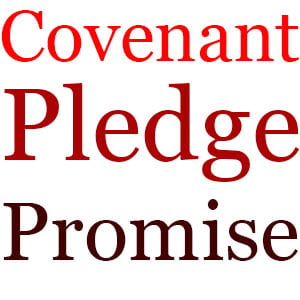8: God and the Covenant – Discussion Starters
- A sure covenant. We have agreements, pacts, contracts, and other forms that lead to a commitment to carry out certain duties or fill requirements in business and other activities of life. What is the difference between the legal documents we use in business and the agreements we seal in our spiritual walk with Jesus? Are you encouraged about the beauty and finality we see in a covenant relationship as
 it applies to our daily life in Jesus? Are you ever tempted to resent having to agree to conditions of being a member of God’s family and long instead for freedom from all agreements?
it applies to our daily life in Jesus? Are you ever tempted to resent having to agree to conditions of being a member of God’s family and long instead for freedom from all agreements? - a. The idea of the covenant. How does our covenant relationship with God shed light on the experience of God’s creation of human beings? Was there a time when Adam and Eve were so new that they didn’t fully understand what a covenant meant in their new life? Or did they have full understanding from the moment of their creation? Considering the magnificence of life without sin and the power of God as revealed to our forefathers, are you ever puzzled about how our people could fall so soon and so far from the plan God had in mind for them? Has there ever been a time in your life when you drifted away and are full of bewilderment today about how that could have happened?
b. Choosing evil over good. Is it hard for you, as it is for me, to imagine God’s children at the beginning preferring evil to God’s goodness? The flood, our lesson author declares, was God’s method of intervention. He desperately wanted a family of love and joy. What did He have instead? The flood was a matter of de-creation. By their bad choices, humans ruined life as God created it. Nearly every human being on earth was destroyed. And God started over. Does that account ever install a sense of awe in your thinking? - Covenants in history. This section of the lesson lists seven covenants of love as defined in the Old Testament. What is the difference between these covenants and the “everlasting covenant”? What is the relationship between these covenants and the plan of salvation? A suggestion: Covenantal structure. Choose one of the four elements in the everlasting covenant and spend an hour contemplating what that aspect of salvation means to you. (1) a preamble; (2) a long historical prologue; (3) blessings and curses; (4) special provision.
- Pledges. Think about each of these and ask the question: Is there any way these pledges can apply to our church life today? Even with minor changes for clarity? Do you ever encounter criticism about the way we Adventists set standards for not working on the Sabbath? Which of the standards listed in the lesson are the most valuable to you in your daily walk with God? Is it possible for you or for me to follow even one of those pledges with full dedication? What does our friend from the past, Ellen White,have to say about the possibility of our living a life of faith?
- The temple. Some churches are elaborate in their structure and design while others are simple and even run down and in need of repair or re-building. What do you think God wants us to do to improve the appearance and functionality of His churches around the world? Or does it matter to Him? Can a church building give the heavenly impression of “a vibrant spiritual life”? There may be changes that could be made in the church where you worship. Maybe it’s a rundown parking space, or furnishings that seem old and out of place. Is God pleased or upset when we work to build elements of beauty and praise into the sanctuaries where we worship him?

Comments
8: God and the Covenant – Discussion Starters — No Comments
Please make sure you have provided a full name in the "Name" field and a working email address we can use to contact you, if necessary. (Your email address will not be published.)
HTML tags allowed in your comment: <a href="" title=""> <abbr title=""> <acronym title=""> <b> <blockquote cite=""> <cite> <code> <del datetime=""> <em> <i> <q cite=""> <s> <strike> <strong>